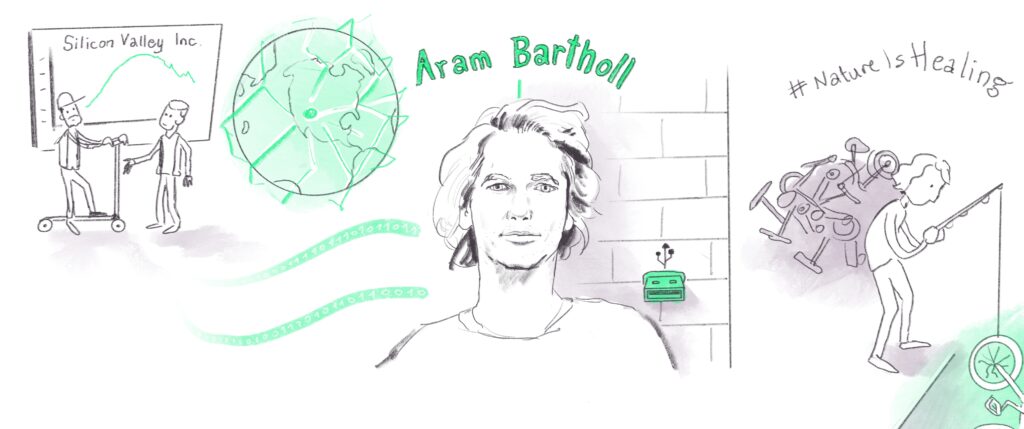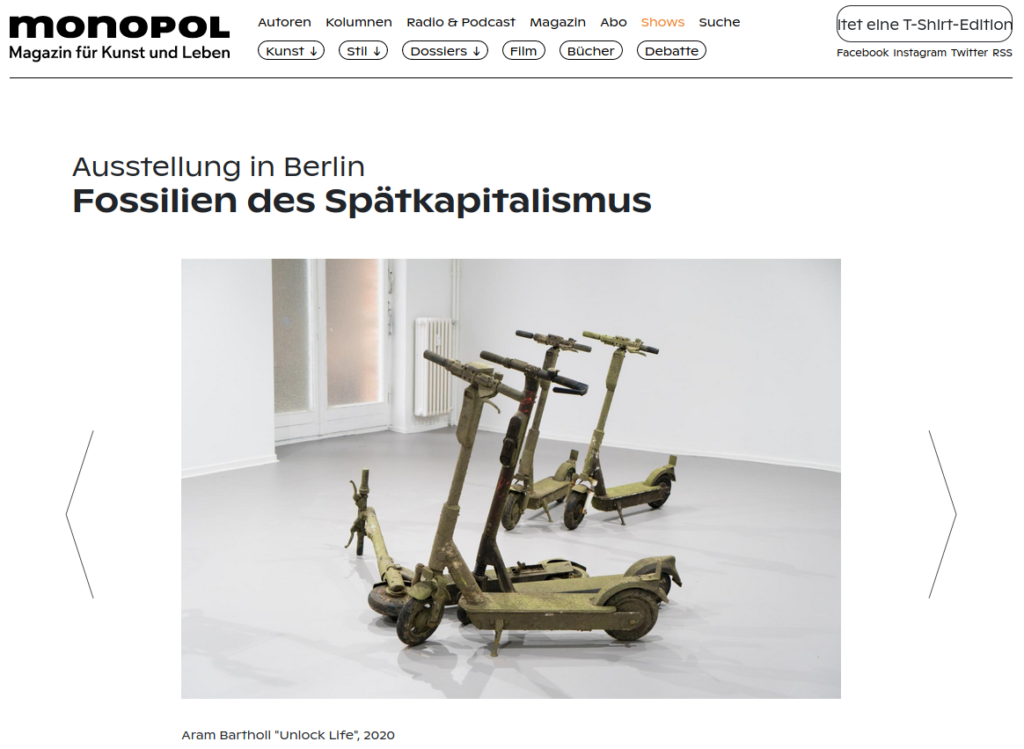
Prof. Agnes Förster and Martin Bangratz from Urban planing RWTH Aachen invited me to their podcast series „Whats Next„. Below their article accompanying the conversation in German. Thx!!
https://www.planung-neu-denken.de/podcasts/crossing-property-lines/
Crossing Property Lines
The relatively soft lockdown in Germany has forced innovation on many firms and schools, revealing the country’s shortcomings in the area of digital transformation, such as broadband access. While some of Aram Bartholl’s friends in the arts and programming scene notice hardly any difference in their routines, other, less digitalized professions have been hit hard. For Mr. Bartholl himself, teaching online has turned out to be a challenge. But what struck him most was the temporary absence of urban public space as a platform for expression. It feels liberating to see large demonstrations back in the city, both for noble and questionable causes.
Aram Bartholl’s work has dealt with digital space since his thesis in architectural studies in 2001. Back then he started with simple interventions – taking boxes from computer games and placing them in the city. He was looking at games such as first-person shooters, where the knowledge of a virtual space is crucial to the gameplay. And he found himself wondering: what does it mean to place objects from a digital realm into physical space? Do the spaces merge, or do they still belong to separate worlds?
This dualism of what is analogue and what is digital is so intertwined these days, that we are unable to distinguish one from the other. […] Of course, everything that happens there is real, it has an effect on our lives. Aram Bartholl 06/2020
A number of techno-social upheavals of our lifetime have influenced Bartholl’s work, as he observes the permeation of digital technology. The first disillusionment around 2000, when the dotcom bubble burst, the introduction of smartphones in 2007, the rise of global Internet corporations. Aram Bartholl has followed these trends closely and is still astonished by the dynamics of these tools which are so inscribed in our society; a tweet by the American president may cause immediate reactions in the stock market or foreign relations. The effects of technological developments are also becoming increasingly manifest in our cities. An early example were delivery services that visibly affect urban logistics and business closures. More recently, electric scooters and bicycles have turned up in cities worldwide – demanding our attention with a colorful design reminiscent of animated icons back in a web 2.0 era. They are objects that seem to bring the promise of a trendy internet startup into urban space, Silicon Valley Solutionism arriving in cities around the globe. Unsurprisingly, their promise of a shift towards sustainable mobility has yet to occur, as that would require political guidance and many other factors to align.
Urban space has always been a native ground for Bartholl’s work. To him, it is more exciting than the white cube with its preconceived notions and expectations about art. Outside, the audience is random and may start a discourse that would never happen in a controlled artistic environment. To encourage people to think critically about the relationship of private property and public space, Aram Bartholl recently took rental bikes from the street to exhibit them as sculptures in a gallery. Visitors were still free to rent the bikes and take them back outside, but the project challenged people’s notions of ownership, of public and private space. In a follow-up project, Bartholl is fishing algae-covered electric scooters out of Berlin’s channels to display at Kunstraum Kreuzberg, showing once again that their promise of sustainability doesn’t hold water.
We are currently experiencing social media and the internet profoundly as a public space for discussion – in contrast to urban space – even though these platforms are run by private firms, with all the problems this entails. Aram Bartholl 06/2020
Just as private objects start to clog up public space, the digital space we perceive as public space is in fact in the hands of private corporations. Inoffensive mottos and ludic logotypes suggest harmlessness, but these firms are ultimately listed and profit-oriented. This seems problematic considering the history of privatization of other public infrastructures. Europe is hard-pressed to develop independent digital infrastructures.
In 2010, Aram Bartholl began a project that has since turned into a global movement: Dead Drops are flash drives embedded in a wall so that only the USB connector sticks out. Not connected to the internet, they constitute a statement against censorship and about the relationship between our new, digital reality, and the brick and mortar of cities. New Dead Drops still pop up, over 2.500 are currently listed globally [link: deaddrops.com]. Sharing things digitally through concepts such as open source and creative commons has led to unprecedented levels of collective production and consumption of content. Movements such as Fridays For Future or Black Lives Matter would not have been possible without the viral effects of social networks. In another recent example, the German hacker and programming community has pushed the government to adopt an open-source approach to their COVID19 tracking app.
Data should be free, Bartholl agrees, yet he urges us to consider what could happen with our data in the future. If research institutions are using photos found online to train artificial intelligence models that may ultimately be used for military purposes, it raises questions about the merit of uploading billions of images each day. And movements such as the alt-right have been quick to adopt internet and meme culture and learned to improve their own false-flag tactics.
Aram Bartholl continues his investigation of technology and space. Given the current discussion around the removal of outmoded monuments, he tinkers with augmented reality to attach digital artefacts to sculptures. And, referencing the hashtag #natureishealing, he announces that he will be fishing for more discarded bicycles in the river Spree.
Aram Bartholl is a Berlin based concept artist who investigates the relationship between digital and physical space. Since 2019, Bartholl teaches art with a focus on digital media as a professor at Hamburg University of Applied Sciences.

